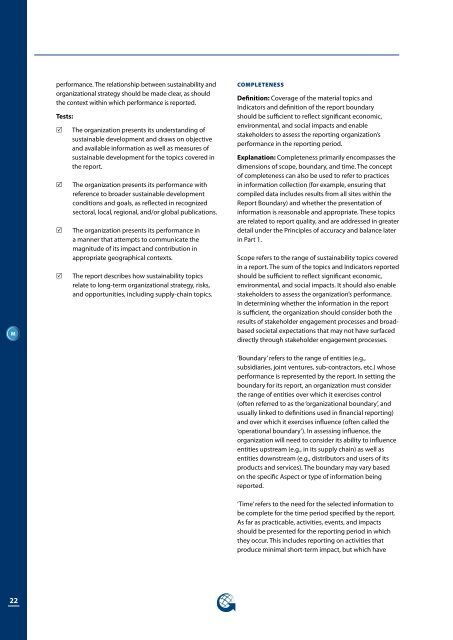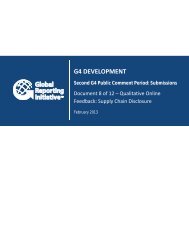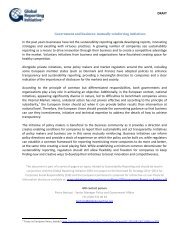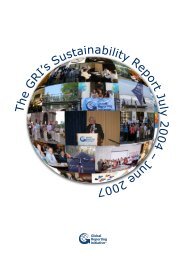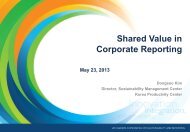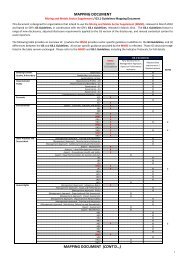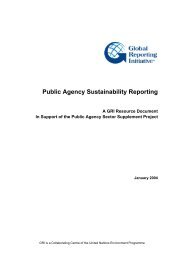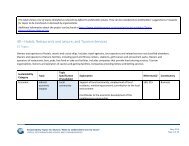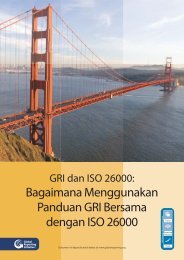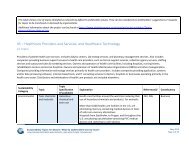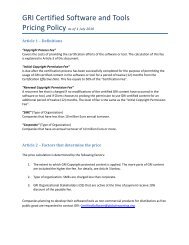Media Sector Supplement - Global Reporting Initiative
Media Sector Supplement - Global Reporting Initiative
Media Sector Supplement - Global Reporting Initiative
You also want an ePaper? Increase the reach of your titles
YUMPU automatically turns print PDFs into web optimized ePapers that Google loves.
22<br />
performance. The relationship between sustainability and<br />
organizational strategy should be made clear, as should<br />
the context within which performance is reported.<br />
Tests:<br />
R The organization presents its understanding of<br />
sustainable development and draws on objective<br />
and available information as well as measures of<br />
sustainable development for the topics covered in<br />
the report.<br />
R The organization presents its performance with<br />
reference to broader sustainable development<br />
conditions and goals, as reflected in recognized<br />
sectoral, local, regional, and/or global publications.<br />
R The organization presents its performance in<br />
a manner that attempts to communicate the<br />
magnitude of its impact and contribution in<br />
appropriate geographical contexts.<br />
R The report describes how sustainability topics<br />
relate to long-term organizational strategy, risks,<br />
and opportunities, including supply-chain topics.<br />
coMpleteneSS<br />
Definition: Coverage of the material topics and<br />
Indicators and definition of the report boundary<br />
should be sufficient to reflect significant economic,<br />
environmental, and social impacts and enable<br />
stakeholders to assess the reporting organization’s<br />
performance in the reporting period.<br />
explanation: Completeness primarily encompasses the<br />
dimensions of scope, boundary, and time. The concept<br />
of completeness can also be used to refer to practices<br />
in information collection (for example, ensuring that<br />
compiled data includes results from all sites within the<br />
Report Boundary) and whether the presentation of<br />
information is reasonable and appropriate. These topics<br />
are related to report quality, and are addressed in greater<br />
detail under the Principles of accuracy and balance later<br />
in Part 1.<br />
Scope refers to the range of sustainability topics covered<br />
in a report. The sum of the topics and Indicators reported<br />
should be sufficient to reflect significant economic,<br />
environmental, and social impacts. It should also enable<br />
stakeholders to assess the organization’s performance.<br />
In determining whether the information in the report<br />
is sufficient, the organization should consider both the<br />
results of stakeholder engagement processes and broadbased<br />
societal expectations that may not have surfaced<br />
directly through stakeholder engagement processes.<br />
‘Boundary’ refers to the range of entities (e.g.,<br />
subsidiaries, joint ventures, sub-contractors, etc.) whose<br />
performance is represented by the report. In setting the<br />
boundary for its report, an organization must consider<br />
the range of entities over which it exercises control<br />
(often referred to as the ‘organizational boundary’, and<br />
usually linked to definitions used in financial reporting)<br />
and over which it exercises influence (often called the<br />
‘operational boundary’). In assessing influence, the<br />
organization will need to consider its ability to influence<br />
entities upstream (e.g., in its supply chain) as well as<br />
entities downstream (e.g., distributors and users of its<br />
products and services). The boundary may vary based<br />
on the specific Aspect or type of information being<br />
reported.<br />
‘Time’ refers to the need for the selected information to<br />
be complete for the time period specified by the report.<br />
As far as practicable, activities, events, and impacts<br />
should be presented for the reporting period in which<br />
they occur. This includes reporting on activities that<br />
produce minimal short-term impact, but which have


